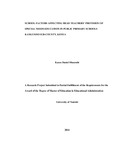| dc.description.abstract | T
hroughout the world, children who have mental disabilities and
many others who
experience difficulties in learning have been traditionally marginalized within or
excluded from schools
.
Th
is has led to
numerous campaigns and advocacy on the
adoption of inclusive education
.
Headteachers face challenges in the provision
of
special needs education among pupils in their schools. Headteachers
in
Kangundo
Sub
-
County, Machakos County face challenges in the provision of special needs
education among pupils in their schools. Further, these pupils continue to drop out of
school s
ince their needs are not addressed
.
The purpose of the study was
therefore
to
investigate school factors affecting public primary schools headteachers’ provision of
special needs education in Kangundo Sub
-
County, Machakos County, Kenya. The
study was guide
d by four research objectives.
The research o
bjective sought to
determine how physical facilities
,
teaching and learning resources
,
adequacy of special
needs teachers
and
financial resources affect headteachers’ provision of special needs
education in Kang
undo Sub
-
County Machakos County, Kenya. The study employed
descriptive survey design. The sample for the study comprised of all the 14
headteachers and 140 teachers. Data was collected by use of questionnaires. The
instruments were also validated and teste
d for reliability. Findings revealed that
6(42.9%) of headteachers revealed that they had barrier free pavements
in the school
to accommodate children with special need.
Findings also revealed that
there were
inadequate financial resources for the special
needs children in the school as indicated
by m
a
jority 9(64.3%) of headteachers
. It was further found out that the funds did not
provide adequate for provision the needs for SNE as indicated by majority 70(51.5%)
of teachers. Majority 98(72.1%) of teachers
revealed that
school
s
did not have
finances to outsource SNE teaching and learning materials. Majority 125(91.9%) of
teachers indicated that their school
were
not able to
purchase
items that SNE children
need
ed
for learning. The study further found out tha
t
financing of special education
still remains a major challenge for the government. Based on the study findings, the
study concluded that pupils
with walking difficulties were able to access classrooms
with ease.
T
he study concluded that
there were inadeq
uate financial resources for the
special needs children in the school and that
the schools got
funds to cater for
inclusive education in the school
from the government.
It was
lastly concluded
that
the
quality of the services for children with special needs in schools was adversely
affected by acute shortage of specialized aids and equipment and
inability
on the side
of the government to fund special education materials and construction of buildings
depending highly on donor funding.
The study recommends that t
he government to
take its rightful and leading role in the provision of education for ch
ildren with special
needs. Non G
overnmental
O
rganization
(NGOs)
and other institutions
should be
encourag
ed to
fund the special education
since schools are not able to fully support the
SNE children | en_US |

